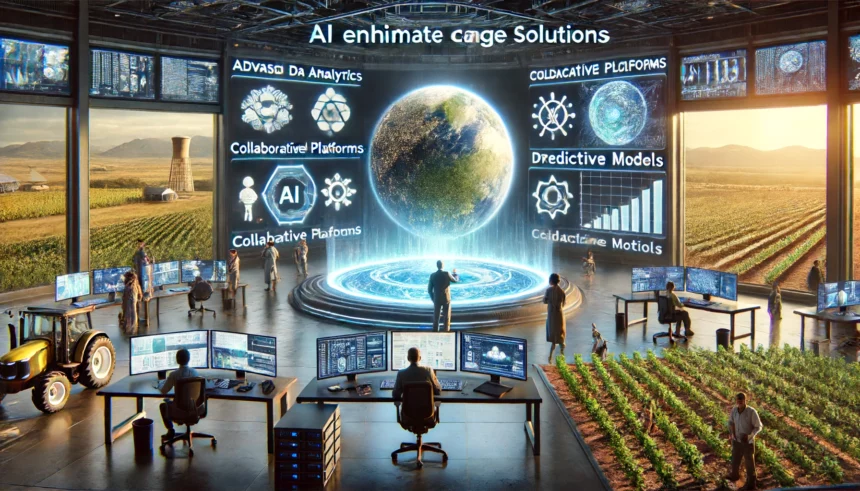As the world grapples with the climate change crisis, it’s clear that no single discipline or viewpoint can provide all the answers. A transdisciplinary approach, which brings together different perspectives and expertise, is essential for developing effective solutions.
Building on this foundation, Artificial Intelligence (AI) significantly enhances transdisciplinary approaches, offering powerful tools to tackle climate change more effectively. AI can gather and analyze large amounts of data from various fields, finding patterns and connections that help us make better decisions about how to fight climate change.
AI Enhances Collaboration and Data Sharing
AI helps people work together by providing platforms for sharing data and collaborating on projects. These tools make it easier for experts from different fields to collaborate smoothly, leading to more integrated and practical solutions.
Predictive Modelling
Predictive modelling is another area where AI shines. It improves the accuracy of climate forecasts, helping us understand potential future scenarios and their impacts. This allows communities and governments to plan better and prepare for different outcomes.
Informed Decision-Making
In decision-making, AI analyzes complex information and offers clear, actionable insights. Policymakers can use these insights to make informed decisions based on solid data. This ensures that strategies are effective and address the root causes of climate issues.
Advanced Visualization Tools
AI also boosts engagement and understanding through advanced visualization tools. These tools turn complex data into easy-to-understand maps, graphs, and simulations, making information accessible to everyone, including those without technical expertise.
Efficiency and Time-Saving
AI can save time in many important areas. By automating routine tasks like preparing funding proposals, publishing research, and designing behavior change campaigns, AI allows experts to focus on strategic planning and innovative thinking. This efficiency speeds up project timelines and enhances the overall impact of climate initiatives.
Grassroots-Level Climate Action
Community members can also use AI for practical, grassroots-level climate action. AI-powered apps can help monitor local environmental conditions, such as air and water quality. These apps analyze sensor data and provide real-time updates, enabling prompt action to mitigate negative impacts.
Community Data Collection
AI platforms can gather and analyze data contributed by community members, such as sightings of wildlife or local climate impacts. This collective data is valuable for improving larger climate models and informing local planning efforts.
Personalized Educational Campaigns
AI can benefit educational campaigns by personalizing content for different audiences within a community. Tailored educational materials can enhance awareness and encourage sustainable practices among diverse groups.
Optimizing Agricultural Practices
Local farmers can optimize their agricultural practices using AI tools that provide insights into weather patterns, soil conditions, and crop management. This technology helps improve yield, reduce resource use, and adapt to changing climatic conditions.
Energy Efficiency Initiatives
AI can also help communities implement energy efficiency initiatives by analyzing consumption patterns and suggesting optimizations, such as better insulation, efficient appliances, or integrating renewable energy solutions.
Disaster Preparedness
Regarding disaster preparedness, AI enhances community readiness for climate-related events like floods or wildfires by predicting occurrences and optimizing response strategies. This proactive approach can save lives and minimize damage.
Overcoming Barriers to AI Adoption
Despite AI’s potential benefits, several barriers make it challenging for grassroots and community groups to use this technology:
- High Costs and Specialized Skills: AI tools can be expensive and require specialized skills, making them less accessible.
- Data Accessibility and Quality: Limited resources and infrastructure can hinder data collection and management.
- Ethical and Privacy Concerns: Organizations need to develop ethical guidelines and privacy standards for using AI, educating individuals on managing risks.
- Interoperability and Integration Issues: Ensuring new AI technologies work well with existing systems can be tricky.
- Training and Workshops: Providing training programs on AI and data science can equip community members with the necessary skills.
Empowering Communities
At AwhiWorld, we promote transdisciplinary approaches alongside AI to tackle complex issues like climate change. Our labs and programs are designed to foster innovation, collaboration, and practical solutions, building skills and knowledge in these critical areas. We offer coaching, mentoring, and workshops to develop these skills, empowering communities to leverage AI strategically, responsibly, and effectively.
Conclusion
Combining AI with transdisciplinary approaches offers a powerful strategy for tackling climate change. At AwhiWorld, we are committed to fostering innovation and collaboration through our initiatives, building a more resilient and sustainable world. By integrating cutting-edge research and technology with community engagement, we aim to create a sustainable future.
















